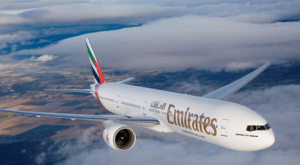Emirates Group posts over $2b profits despite global challenges
 The Emirates Group has announced its 28th consecutive year of profit and steady business expansion, ending the 2015-2016 financial year with a strong position despite the global and operational challenges.
The Emirates Group has announced its 28th consecutive year of profit and steady business expansion, ending the 2015-2016 financial year with a strong position despite the global and operational challenges.
During the year under review both Emirates and Dnata achieved new capacity and profit milestones as the group continued to expand its global footprint and strengthen its business through strategic investments.
A statement issued to the GNA said the company’s Annual Report showed the Emirates Group posted a profit of AED 8.2 billion (US$ 2.2 billion) for the financial year ending 31 March 2016, up 50 per cent from last year.
In line with the overall profit, the Group declared a dividend of AED 2.5 billion (US$ 681 million) to the Investment Corporation of Dubai.
The Group’s revenue however, decreased by three per cent the previous year to AED 93 billion (US$ 25.3 billion) while its cash balance increased strongly to AED 23.5 billion (US$ 6.4 billion).
With significant currency devaluations against the US dollar and fare adjustments following the reduction in fuel prices, Emirates Airlines’ revenue dropped four per cent to AED 85 billion (US$ 23.2 billion).
Sheikh Ahmed bin Saeed Al Maktoum, the Chairman and Chief Executive of Emirates Airline and Group, said: “Emirates and Dnata delivered record profits, solid business results, and continued to grow throughout 2015-16.
“Against an unfavourable currency situation which eroded our revenues and profits, an uncertain global economic environment dogged by weak consumer and investor sentiment as well as ongoing socio-political instability in many regions around the world, the Group’s performance is testament to the success of our business model and strategies.”
He said the Group’s ongoing investments in its people and in enhancing business performance enabled it to react with agility to the new challenges and opportunities that came yearly.
“In 2015-16 the Group collectively invested over AED 17.3 billion (US$ 4.7 billion) in new aircraft and equipment, the acquisition of companies, modern facilities, the latest technologies, and staff initiatives. These will build on our strong foundations, extend our competitive edge, and accelerate our progress towards our long-term goals,” Sheikh Al Maktoum said.
The Group’s employee base across its more than 80 subsidiaries and companies increased by 13 per cent to over 95,000 strong representing over 160 different nationalities.
He said the Group expected that the low oil prices would continue to be a double-edged sword in the year ahead, a boon for its operating costs as fuel remained the biggest cost factor, but a bane for global business and consumer confidence.
“However, we enter the new financial year with confidence, backed by a robust balance sheet, solid track record, diverse global portfolio, and international talent pool. We will continue to evolve and grow our business profitably, and work even harder to meet and exceed our customers’ expectations,” said Sheikh Al Maktoum.
Emirates’ total passenger and cargo capacity crossed the 56 billion mark to 56.4 billion Available Tonne Kilometres (ATKMs) at the end of 2015-16, cementing its position as the world’s largest international airline. It also increased capacity during the year by 5.5 billion (ATKMs) or 11 per cent over 2014-15.
Emirates received 29 new aircraft, its highest number during a financial year including 16 A380s, 12 Boeing 777-300ERs and one Boeing 777F, bringing its total fleet count to 251 at the end of March. At the same time nine aircraft were phased out taking the average fleet age down to 74 months or approximately half the industry average of 140 months.
However, total operating costs decreased by eight per cent over the 2014-15 financial year. The average price of jet fuel fell during the financial year, supporting Emirates’ bottom line improvement.
For 2016-17, Emirates has announced new routes to Yinchuan and Zhengzhou in China, Yangon in Myanmar and Hanoi in Vietnam, aside from capacity upgrades to existing destinations.
Emirates SkyCargo continued to play an integral role in the company’s expanding operations, contributing 14 per cent of the airline’s total transport revenue.
Source: GNA
